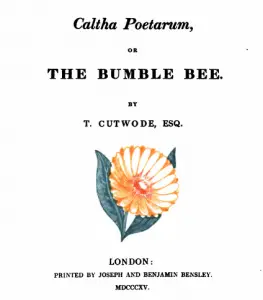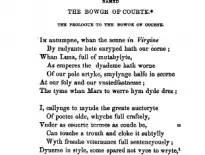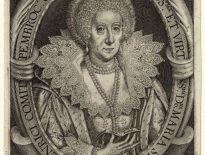 On 6th February 1561, poet Tailboys Dymoke (pseudonym Thomas Cutwode) was baptised at Kyme in Lincolnshire. He was the son of Sir Robert Dymoke, and his wife, Bridget (née Clinton).
On 6th February 1561, poet Tailboys Dymoke (pseudonym Thomas Cutwode) was baptised at Kyme in Lincolnshire. He was the son of Sir Robert Dymoke, and his wife, Bridget (née Clinton).
Dymoke is known for his allegorical poem, Caltha poetarum, or, "The Bumble Bee", which he published in 1599 under the name of Thomas Cutwode, "cut wood" being the English translation of Dymoke's first name, the French "taille-bois". The poem comprises 187 seven-line stanzas, so is rather long, but you can read it on Google Books at https://books.google.es/books/about/Caltha_Poetarum_Or_The_Bumble_Bee.html?id=xwxEAQAAMAAJ&redir_esc=y
Other works by Dymoke include a slanderous poem which he and his brother Edward were accused of writing about their uncle, Henry Clinton, Earl of Lincoln, which was called Faunus his Four Poetical Furies. Unfortunately, the poem does not survive. Dymoke also wrote a play, in which he also acted, "The Death of the Lord of Kyme", which was performed at Kyme in August 1601. Dymoke and his brother were charged with "for contriving and acting a stage play … containing scurrilous and slanderous matter", amongst other things, after the Earl of Lincoln complained. The earl won his case and according to Dymoke's biographer, Eleri Larkum, although those involved suffered severe penalties, "Dymoke, however, escaped the judgment".
Dymoke died before February 1603.
Source: Larkum, E. (2004-09-23). Dymoke, Tailboys [pseud. Thomas Cutwode] (bap. 1561, d. 1602/3), poet. Oxford Dictionary of National Biography. http://www.oxforddnb.com/view/10.1093/ref:odnb/9780198614128.001.0001/odnb-9780198614128-e-6985.



Leave a Reply